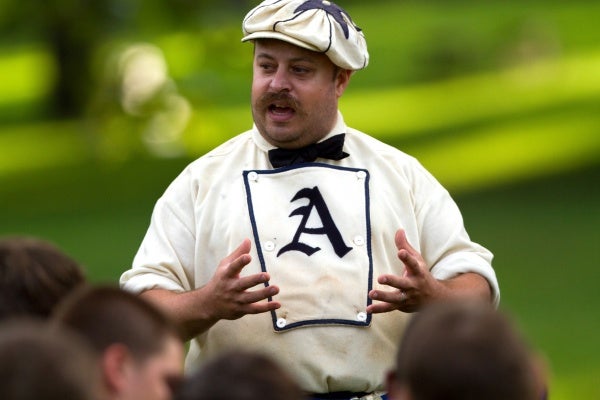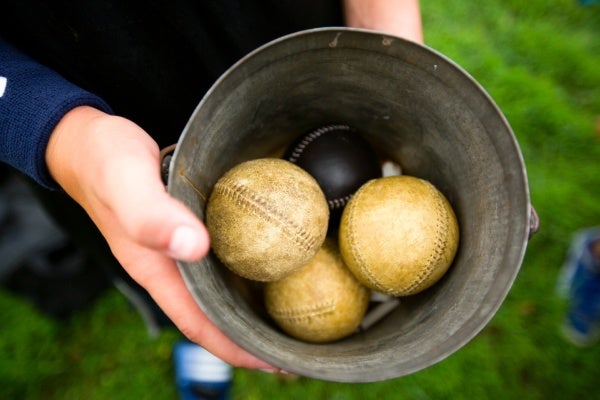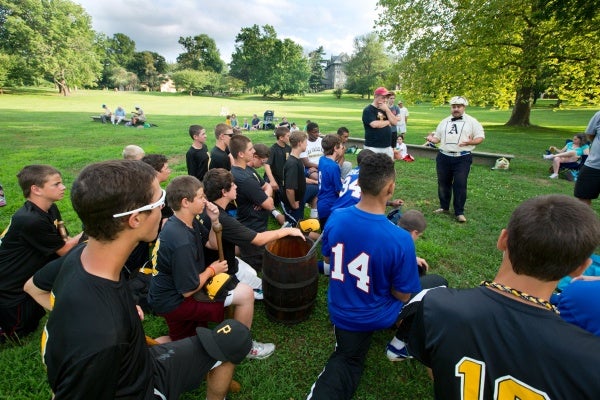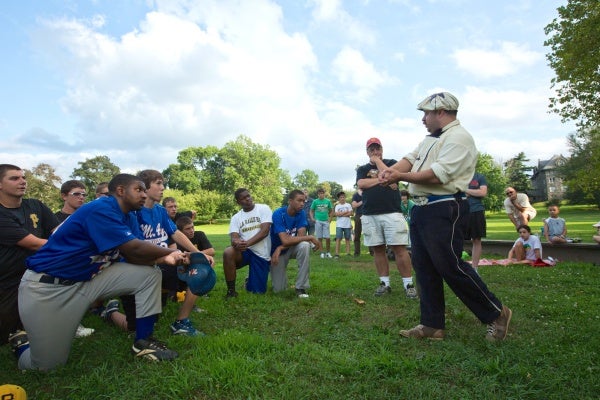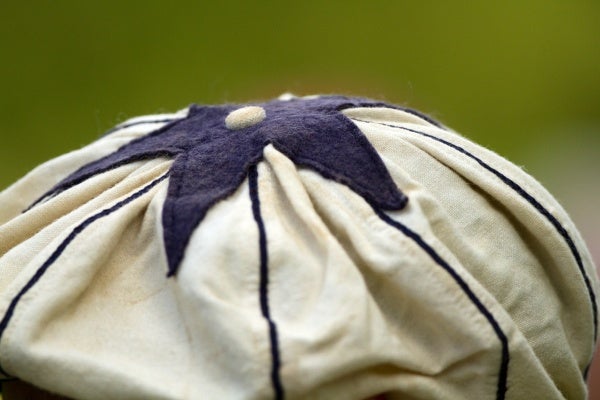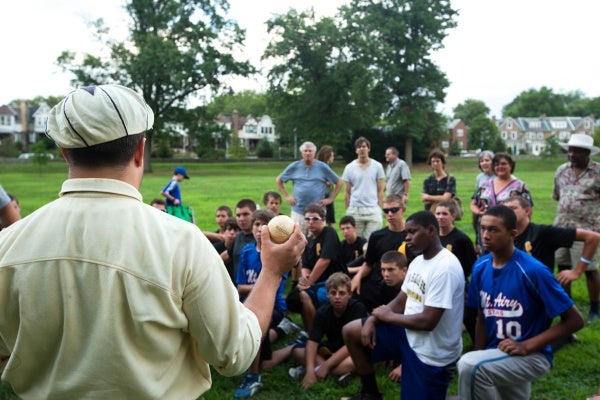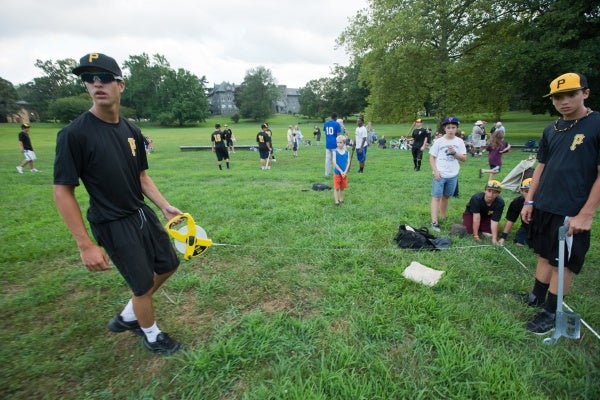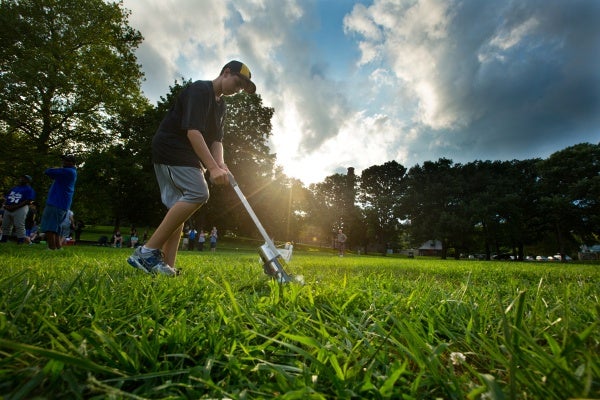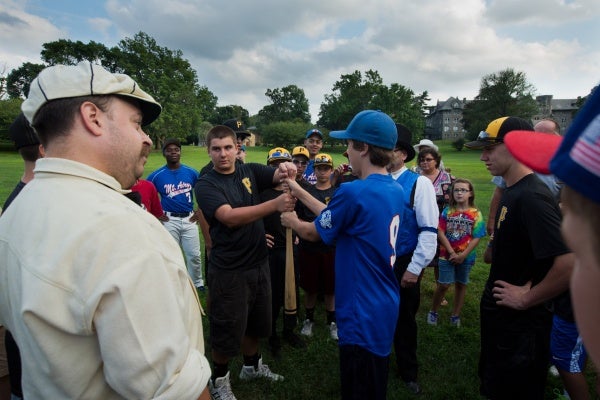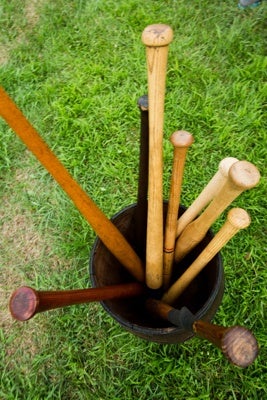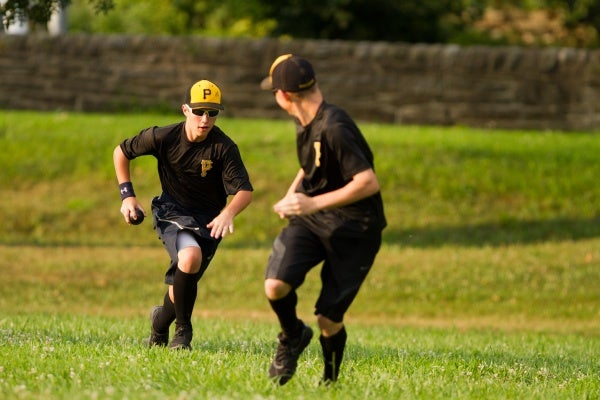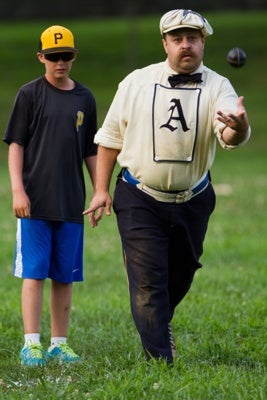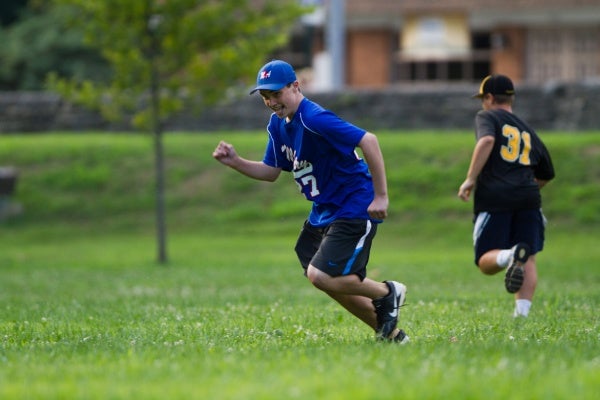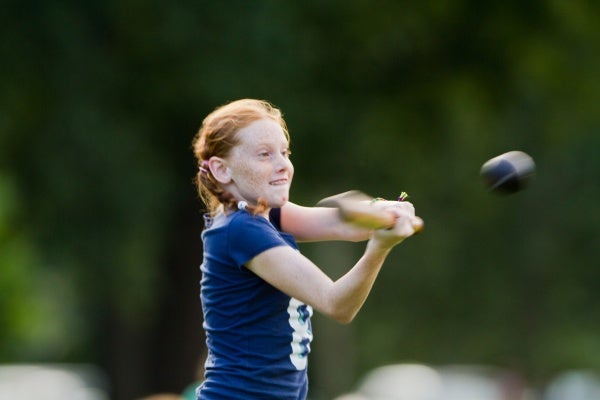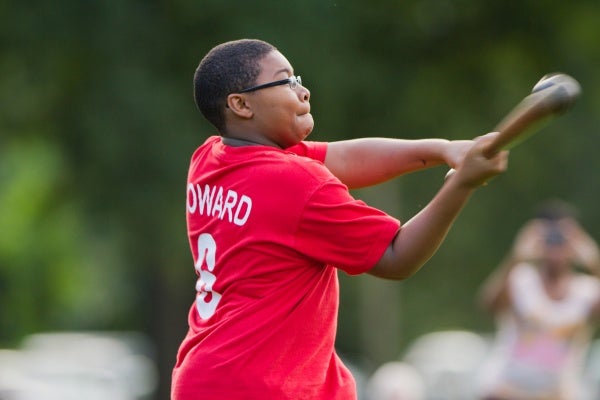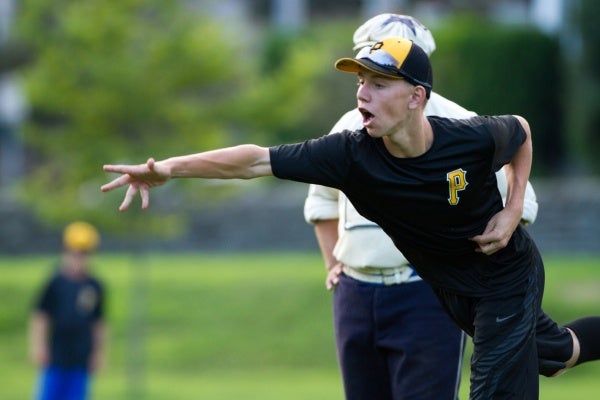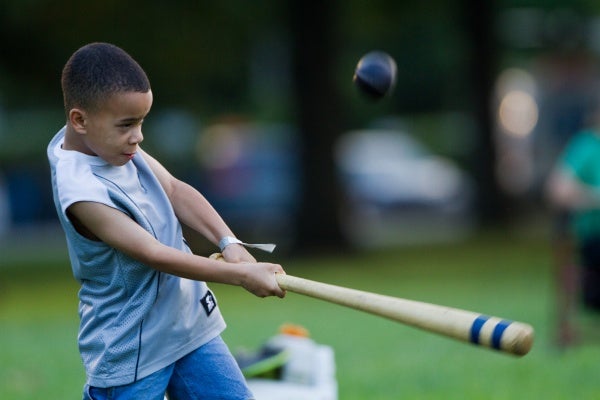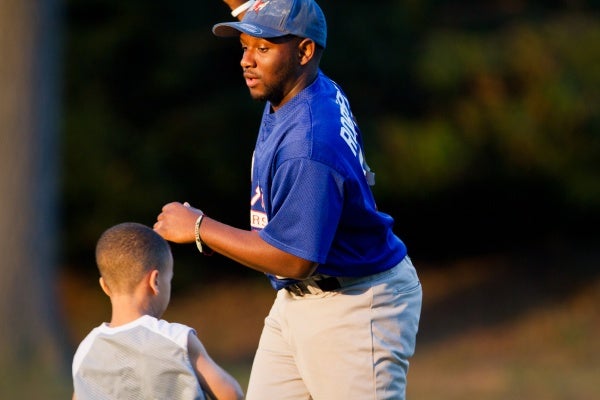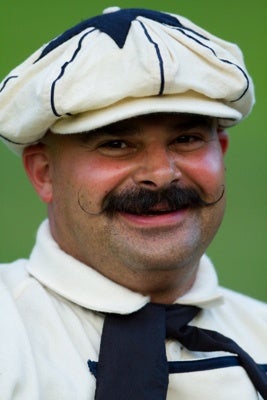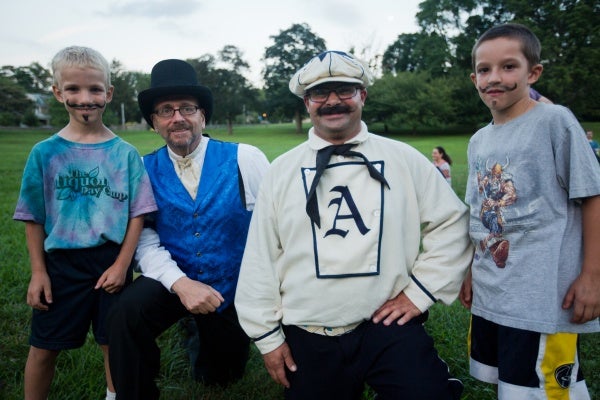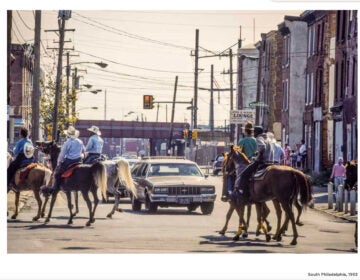Old-time baseball exhibition game showcases how the game looked in 1864
Green grass, four bases ninety feet apart, scurrying fielders and runners: yes, it was unmistakably baseball that was being played on the lawn of New Covenant Church in Mt. Airy on Monday evening. But even a cursory spectator could see that the game played by teenage players from the Mt. Airy Baseball 16U team and the touring Potter Baseball amateur team based in Maryland had some striking differences from the sport that’s been seen on diamonds across the country for more than a century.
The umpire (who was resplendent in a top hat and fancy vest) issued “warnings” to pitchers who didn’t throw pitches in or near the strike zone – and all those pitches were delivered underhand. Batters were likewise warned if they didn’t swing at hittable pitches. Foul balls weren’t counted as strikes. Fly balls and pop-ups caught on one bounce were outs. Grounders that hit in fair territory but rolled foul before reaching the first or third base bags were ruled fair balls. And nobody – not even the catcher – wore a glove.
The reason for all these changes? This was “vintage” baseball – the game as it was played in 1864.
It was spelled base ball
Four players dressed in 1860s-style uniforms plus the umpire had come from the Philadelphia Athletics Base Ball Club came to New Covenant to give the players and the crowd of about 60 spectators a tutorial on the way the game was played back in its early days. The club plays between 15-20 games a year with other vintage “base ball” clubs. (You may be surprised to know that until as late as about 1930 the sport was always known as base ball – two words – rather than baseball.)
Scott Alberts, president of the club, gave a short introduction on the early history of the game, which in its first years featured a large number of amateur clubs all playing by their own sets of rules. He said that a group known as the National Association of Base Ball Players was set up to organize and standardize the rules, which had been constantly in flux. The Athletics chose the 1864 rules, he said, “because it’s a perfect bridge between then and now. This is when the game first really resembles baseball.”
Umpires, he said, were generally chosen from respected members of the communities and they dressed formally in those days, hence the finery worn by umpire Stephen Workman on Monday. In the early days, Alberts said, players didn’t argue with the umpire, who also might be called the “arbiter” or “judge.” Though he quickly added, “Unless there was a lot of money riding on the game!”
Before Jackie Robison there was the Pythians
Alberts also spoke of a little-known effort that he called “the first attempt of racially integrating baseball,” 80 years before Jackie Robinson and the Brooklyn Dodgers integrated major league baseball in 1947.
Octavius Catto was a pioneering African American civil rights activist in Philadelphia in the 1860s. He was also, Alberts said, “One heck of a shortstop.” He organized the Pythian Club of black players and challenged white clubs to games in the 1860s. One club, also known as the Athletics, accepted the challenge and played the Pythians, who acquitted themselves well. The Athletics then supported the Pythians when they applied for membership in the National Association. However, the Association refused to act on their application. Then in 1867, in a formal vote, the association spelled out that it would not accept any club with black players.
Let’s play base ball
After the run-down of rules and history was over the players took the field, with both teams composed of players from both Mt. Airy Baseball and Potter Baseball. And you could quickly see that while the game was a bit different, Alberts was right when he said, “After 150 years there’ve been a lot of changes – but it’s still baseball.”
The fielding was a little more ragged than you’d expect from players of this skill level as the lack of baseball gloves obviously hampered everybody. (Alberts said that the lack of gloves, not the rule changes, was the toughest thing for new vintage players to get used to). But they seemed to adjust pretty quickly. Some long flies were caught in the air, the throwing was accurate and there was a lot of daring baserunning and close plays at the plate. Nobody was keeping score and young boys and girls from the crowd often joined the teams at the plate and in the field, but it was indeed still baseball.
Alberts had mentioned that catching a fly on one bounce for an out rather than in the air was sometimes met with jeers of “unmanly!” by the opposing team back in the 1860s, and good-natured shouts of “unmanly” rang out when someone muffed a fly or threw wildly.
In addition to Alberts, Athletics players Tim Sweeney, Brett Mandel, and Frank Tarant took the field two at a time to advise the players and make an occasional play themselves. Alberts and Tarant had grown luxurious 1860s-style mustaches, which in Tarant’s case sometimes caused him problems. He uses beeswax to put elaborate curls in the ends of his mustache. He joked, “Beeswax doesn’t really hold too well in the heat. But it’s a hit with the ladies so I carry on.”
Renewed interest in old-time base ball
The genesis of the game was an exhibition that the Athletics had put on in Roxborough two years ago. Charles Bender, who was running the Mt. Airy Baseball side of things on Monday night, saw that game and enjoyed it, and thought his players would too.
The stop in Mt. Airy was the next-to-last on the tour for the Potter Baseball contingent, said Jeff Potter who operates the organization. They don’t just play baseball on tour: a large part of the experience is community service work in the cities they visit, said Potter, a former minor league ballplayer himself. “It’s all about giving back,” he said. The next stop on their tour was Ocean City NJ, and then back to Maryland.
The Philadelphia Athletics Base Ball Club has its home field next to Memorial Hall in Fairmount Park and plays a dozen or so dates each year, always double-headers from 1-5 p.m., against teams from New York to Virginia. Their games can be high-scoring affairs – “We’ve played games that were 18-16,” said Alberts – but not always. “Low scoring games are especially prized, because that means that everyone is doing their job.”
For more information about the club visit Philly Vintage Baseball.
WHYY is your source for fact-based, in-depth journalism and information. As a nonprofit organization, we rely on financial support from readers like you. Please give today.


